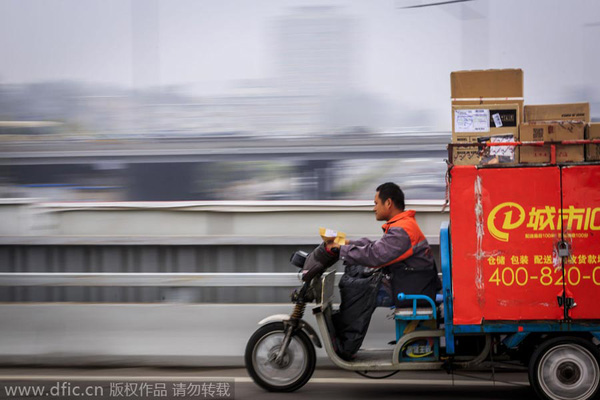Courier companies to face punishment for info leaks
Updated: 2015-11-16 15:49
(Xinhua)
|
|||||||||||
 |
|
A courier en route to deliver packages in Beiing, Oct 11, 2014. [Photo/IC] |
BEIJING - Chinese courier companies might face fines of up to 50,000 yuan (around $7,814) and license revocation for leaking customers' personal information, according to draft regulations unveiled on Monday.
Express companies should regularly destroy waybills and are prohibited from selling, leaking or illegally providing customers' personal information, the draft rules stipulate.
The draft will be posted online to solicit public opinion until Dec 15, the Legislative Affairs Office of the State Council said.
This is good news for express delivery customers who worry that a new real name policy for parcels might be a privacy threat.
Personal identifications and contact details have been required in order to send parcels since Nov 1. The decision was announced after letter bombs killed at least seven people and injured dozens more on Sept 30 and Oct 1 in Liucheng county of the Guangxi Zhuang autonomous region.
Under the draft rules, items that could endanger national security, social stability and public interest are banned from delivery, while delivery service staff are required to check goods before packaging.
The draft also addresses rough handling of parcels, which has led to a number of customer complaints.
Couriers who toss or step on parcels, or otherwise mishandle packages in a way that causes damage, could face fines up to 50,000 yuan as well as suspension of company operations.
Despite a slowing economy, courier services have grown steadily in China as online shopping has gained popularity.
The sector has registered annual growth of over 50 percent for the past five years, and almost 20 billion parcels are expected to be delivered in 2015, figures from the State Post Bureau show.
On average, each Chinese person received more than 10 parcels last year, though only half of the country is covered by delivery networks.
Related Stories
Courier companies go hi-tech to cope with delivery rush 2015-11-12 15:46
One-armed courier reaches for self-reliance 2015-11-11 17:24
China requires real-name for courier service after deadly mail bombs 2015-10-22 19:49
HIV-infected parcels found in Beijing's delivery system 2015-10-22 08:04
Special delivery for college-bound student 2015-08-21 11:56
Today's Top News
First attacker identified as French national
Opinion: France attacks spark global war on terrorism
Online land of milk and honey
Push for greater role in economic decision-making
Schengen agreement under threat: Tusk
Myanmar's opposition wins right to form new govt
China's migrant population expected to reach 291m by 2020
China sends more currency overseas to meet demand
Hot Topics
Lunar probe , China growth forecasts, Emission rules get tougher, China seen through 'colored lens', International board,
Editor's Picks

|

|

|

|

|

|






